
Patient Experiences – World Lupus Day 2023
 May 09th, 2023
May 09th, 2023 Nakita Cambow
Nakita Cambow Blog
Blog 0 Comments
0 Comments
Thank you to everyone who has taken part in our 2023 World Lupus Day social campaign. We really appreciate you sharing your lupus experience and advice with us!
Holly Greenhalgh
 Hiya, my name is Holly! I’m a 22-year-old, originally from Aberdeen but currently studying at the University of Glasgow. I was diagnosed with lupus when I was 17 years old, just after completing my higher exams. Due to the stress of exams, I started to get severe joint pain in my fingers and my knees but I just put it down to playing hockey and writing. The pain was agony. There wasn’t a moment when I wasn’t thinking about it. It wasn’t until the butterfly rash started to appear on my face that I knew this wasn’t normal. After a long and agonising wait to see a rheumatologist, I got my diagnosis, which was oddly relieving as it meant the pain was finally going to end. More than a year went by, and everything seemed absolutely fine, but then my doctor noticed unusual results in some of my tests and decided that a kidney biopsy was necessary. Just a few months before I was meant to go travelling in Australia, I got the news that my lupus had infected around 50% of the cells in my kidneys. I really thought that Australia was out of the picture. However, thanks to the amazing team at Aberdeen Hospital, they sorted me out really quickly and sent me on my way.
Hiya, my name is Holly! I’m a 22-year-old, originally from Aberdeen but currently studying at the University of Glasgow. I was diagnosed with lupus when I was 17 years old, just after completing my higher exams. Due to the stress of exams, I started to get severe joint pain in my fingers and my knees but I just put it down to playing hockey and writing. The pain was agony. There wasn’t a moment when I wasn’t thinking about it. It wasn’t until the butterfly rash started to appear on my face that I knew this wasn’t normal. After a long and agonising wait to see a rheumatologist, I got my diagnosis, which was oddly relieving as it meant the pain was finally going to end. More than a year went by, and everything seemed absolutely fine, but then my doctor noticed unusual results in some of my tests and decided that a kidney biopsy was necessary. Just a few months before I was meant to go travelling in Australia, I got the news that my lupus had infected around 50% of the cells in my kidneys. I really thought that Australia was out of the picture. However, thanks to the amazing team at Aberdeen Hospital, they sorted me out really quickly and sent me on my way.
Starting university with a chronic illness at 19 was not much fun. It wasn’t until that moment that I felt truly alone. I was almost embarrassed about my illness and was scared that it would be something that defined me. I was so resistant to joining any Facebook support groups, or even speaking to friends about it, only pushing me further into isolation. It was only when my kidneys relapsed in October last year and I was the lowest I have ever been that I realised that my friends are here for a reason. Those are the exact moments when I need their support. I will never fully appreciate how lucky I am to have the support I do around me and will never allow myself to push that away again. I have now built up the courage to join some Facebook support groups and cannot wait for my first coffee morning where I can actually meet another person with lupus.
My lupus isn’t ever going to go away, so I needed to stop acting like a could just ignore it.
My one piece of advice is to reach out to those around you, they’re with you for a reason. Don’t ever let yourself believe you are a burden to other people if you’re struggling, you deserve to be happy.
Nina Kumari-Singh
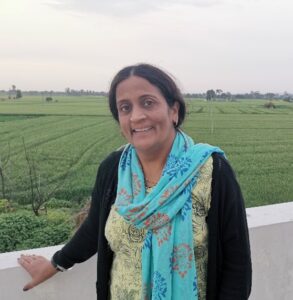 Hi my name is Nina, I am 52 years old, married and have 2 adult boys and I work as a customer service assistant in a bank.
Hi my name is Nina, I am 52 years old, married and have 2 adult boys and I work as a customer service assistant in a bank.
I have systemic lupus erythematosus (SLE) diagnosed for 14 years. Prior to this, I had rheumatoid arthritis for 6 years. In 2003 my mum passed away suddenly in her sleep and due to this shock and stress my rheumatoid arthritis developed into SLE. It took 6 years to diagnose.
At the beginning, I had sore swollen stiffness in my joints, which developed into constant sickness, dizziness, headaches, blemishes on the face, fatigue, regular fever, and constant infections. After many hospital visits, x-rays, blood tests, and scans it took a referral to a specialist Dr D’Cruz – (Rheumatologist specialist) to diagnose me with Lupus. This was a relief as after 6 years I finally got an answer to why I was feeling so sick. I had to google/research a lot about SLE Lupus. I was seen at the Louise Coote Lupus Centre in London – (now a rheumatology department at Guys St Thomas Hospital). There was so much information/leaflets/books etc available to explain the disease, and this made it easier for me to understand and explain to the family what I’m going through.
Slowly, I started to accept having Lupus (my boys called it silly lupus (SLE)). The medication helped me control my lupus. I started to understand what was good for my health and what wasn’t – e.g. sunlight/heat/stress. I had to understand my limits to control my lupus. Whenever I go to parties/visit relatives I make them aware of my disease which helps people understand the lesions on my face. I had to go from full-time to part-time at work to help me cope with this disease. All my customers and work colleagues are aware of me having lupus and it makes it easier for me. They are very understanding of my good and bad health days. At work, I have completed a work health assessment – allowing me to have my own chair to help me with my blood circulation. I am also given time to take my medication and do less strenuous tasks.
I have taken many medications and steroid injections to help me control my illness. Medication at the beginning was -Azathioprine/ Hydroxychloroquine/ Methotrexate/ all of which gave me side effects (sickness/headaches/trouble sleeping). Now I’m on Mycophenolate / Omeprazole/ Candesartan/ Adcal/ Gabapentin/ Levothyroxine/ Neditol/Methenamine Hippurate/Ferrous Gluconate/Aspirin. I have been on the above medication for 14 years which has helped to control my Lupus. I was also on various doses of steroids (Prednisolone) for 13 years to help me control my lupus, which made me gain weight causing aching joints – a moon face / trouble sleeping. But luckily slowly for the last year I have been able to stop my steroid medication with no side effects allowing me to resume my normal weight and lose my moon face. But unfortunately, being on steroids for so long has affected my teeth – I lost all the lower set of my teeth and have replaced them with a set of dentures as my dentist says I’m unable to have implants due to lupus effecting my jaw.
Lupus is a disease which effects many organs – it has affected my lungs – I suffer from shrinking lung syndrome causing me to have a constant irritated cough and being breathless. It has affected my kidneys (lupus nephritis). I have regular urine infections and temperature. I regularly take an antibiotic course Nitrofurantoin, as I’ve also ended up in hospital with sepsis from a urine infection. It affected my nerves and spinal cord causing Neuropathy. I was unable to walk, and I was admitted to hospital and offered an infusion drug called Rituximab. I had two doses where it was given as an infusion treatment taking 4/6 hours every 2 weeks. Since the treatment I have increased my working days to 4 from 3 – I can do more chores around the house, do some gardening, shopping by myself. I feel so happy and confident.
Covid hit everywhere and made me more vulnerable. I was off work self-isolating at home for 2 years with my family, very hard considering I am a people person. I spent most days cooking, cleaning, watching TV and doing jigsaws. I have had 5 covid injections – Pfizer and Moderna vaccine. My family and I caught covid once – and I had the covid treatment via infusion at the hospital to help me recover from covid.
I have now joined the South East Coffee Morning group for people with lupus – we get together once a month, have coffee/tea/cake and chat with other people living with the disease which comes in all different formats. We discuss medication and what different remedies/foods/ help cope with Lupus. I have also joined LUPUS UK & Lupus Support Group on Facebook where I learn about other people’s symptoms, medication, treatments and advice e.g travel insurance for people with lupus and charity events. I find this great as it’s a place where I can relate and share my lupus feelings/illness with other lupies!
If you’re newly diagnosed with lupus, don’t let it bring you down, learn your limits for things you can and can’t do and let people/family know how you’re feeling. Once you accept lupus you’ll slowly learn how to come to terms with this disease. You get good days and bad days, as long as you see light at the end of the tunnel when you’re ill. With the right medication I find myself living a normal life, with the support of my family. It may take time for your body to recover but we are definitely lupus Warriors!
Khiry Rowe- Hopkins
 My name is Khiry I am 32 years old and from London, I love spending time with my family also a big football fan and support Man United and I am very passionate about them watching every match on tv and even going to the occasional game.
My name is Khiry I am 32 years old and from London, I love spending time with my family also a big football fan and support Man United and I am very passionate about them watching every match on tv and even going to the occasional game.
I was first diagnosed with lupus in 2009 when I was just 18 years old, in February of that same year I started noticing I was waking up with joint pains but as a young boy, I just thought it was either growing pains or I was just sleeping bad. As the months went on the pains were not getting any better so in May/ June I went to the doctors after telling them my symptoms they gave me some anti-inflammatory tablets to take but after taking these for about a week my symptoms did not improve and if anything had got worse so I went back to the doctors and explained this so they then referred me to the hospital where they took a blood test and I had to produce a urine sample for them, after telling the doctor my symptoms he said to me he was 95% certain I had lupus. Now at the time I had no idea what it was and had never even heard of it, after about a week or so I got a letter in the post to tell me that I indeed did have lupus which obviously was a big shock not just for me but my family also and I remember crying thinking to myself what does this mean for me and how will it impact my future going forward.
As I had no idea what lupus was, I did most of the research myself online to find out about the condition I had been diagnosed with, I learned that it was an autoimmune disease that could affect your skin, joints, brain, heart and lungs in my case it was my kidneys, my great gran was on dialysis so I had a brief idea about kidney disease but learning about lupus was something completely new to me, it was scary because I had never been ill in my life so to be faced with this life-changing condition at such a young age was hard to digest and would take a long time to get used to.
My advice to anyone that has been recently diagnosed with lupus or is looking for a diagnosis would be not to look online, if you feel something is wrong to go straight to your doctor, I was young and thought it was not anything serious and left it a lot longer then I should have but I would advise seeing someone asap. Also, another thing is don’t feel like it is the end of the world you can still do anything you set your mind to despite being diagnosed with lupus, you are no different to anyone else so continue with your goals and your dreams. You Control the illness don’t let the illness control you!
Megan Saunders

My name is Megan, I am 23 years old and from Belfast, Northern Ireland. I have recently graduated from QUB with a masters in youth justice. I have a one year old yellow Labrador named Apollo, he is the best company and takes up most of my time and energy.
I received my SLE diagnosis in January 2022. I first started noticing symptoms in 2020. These symptoms included extreme fatigue, body aches, joint pain, ulcers, muscle pain, hair loss, honestly the list is almost endless. I spent every day feeling unwell, weak and in pain. It took around 2 years to receive my SLE diagnosis. Since being diagnosed and researching into lupus I have found that this was a relatively quick diagnosis. I feel like it is important to note that although it’s a struggle and so difficult to get to the point of diagnosis, once you actually receive it, it is the start of an entirely different battle. Each case of lupus is unique and different, this makes treating it difficult.
When learning about lupus and the extensive impact it can have on the body it was scary. I felt like my body was letting me down, and it was extending frustrating. I was at a point in my life where I had just received my undergraduate degree and was working towards my masters. This was meant to be when I got to start living my life, looking for a job, moving out, and becoming an independent young adult. Unfortunately for me, lupus delayed my plan, but it’s also taught me a lot about myself. Every single day with lupus is different so it can be frustrating and challenging. On bad days, which happen often, it can be hard to focus on the positives. I have learnt little tricks to make some tasks easier but ultimately I rely heavily on the family and friend around me. The support circle I have has made the transition to life with lupus so much easier and I could not have done it without them. They say lupus is ‘invisible’ and that makes it all the harder for those around us to understand what we are going through. This is another reason why it is important to be open and honest in discussing lupus.
Upon receiving my diagnosis I was given a range of leaflets from the rheumatologist from LUPUS UK, these were extremely helpful and handy as I could pass them on to family and friends to help them understand it also. There is also a lot of up-to-date information on the LUPUS UK website regarding treatment options, fundraising and events taking place connecting those with lupus.
Lupus patients within the Belfast trust also have access to a lupus nurse, named Cathal. He is an excellent resource to have, he was very understanding and helpful. He is always there to answer any worries or questions. He really shaped the beginning of my lupus journey and I’ll always be very grateful for this. Lastly, I received great support from a local lupus warrior named Roisin, she is always available for a chat and offers great advice. For those newly diagnosed, do not be afraid to reach out to those with the same or similar conditions.
Learning about lupus and the impact it can have is unnerving. It is frightening to realise I am only at the start of my journey with lupus. This is what has driven me to want to speak out and raise awareness about living with lupus.
One of the most important pieces of advice I could offer is that having this condition is not a linear process, some days will be good and some days will be bad, accepting this early on will make the process a lot easier.
Another piece of advice which I think is really important, lupus is not just physical, it comes with its own mental battles too, particularly after receiving this diagnosis in my early twenties. Being diagnosed with lupus is not something you will come to terms with overnight. It is important to speak up and ask for help when you need it, do not let things bottle up inside.
For those looking for a diagnosis, you know your own body, you’ll know it better than any doctor or medical professional you meet. If you feel something is wrong, keep pushing until you get answers.
Lastly, no matter how hard it is, try to remain positive. Find something in each day that is a positive, it doesn’t have to be anything big. A small win is still a win.
Lou
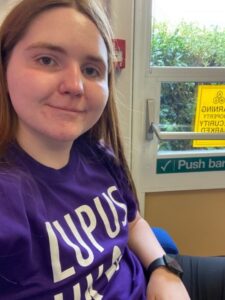 My name is Lou, and I am 23. I was diagnosed with lupus and rheumatoid arthritis in 2015 when I was 15 years old. I started noticing symptoms around April/May of 2015. It started off with me not being able to make a fist and general achiness and pain all over. This was accompanied with hair loss and fatigue. I was then given my diagnosis of lupus in September 2015. I was lucky to get my diagnosis so quickly which is something I hadn’t realised at the time.
My name is Lou, and I am 23. I was diagnosed with lupus and rheumatoid arthritis in 2015 when I was 15 years old. I started noticing symptoms around April/May of 2015. It started off with me not being able to make a fist and general achiness and pain all over. This was accompanied with hair loss and fatigue. I was then given my diagnosis of lupus in September 2015. I was lucky to get my diagnosis so quickly which is something I hadn’t realised at the time.
Once I was given my diagnosis, I felt relieved. For a long time, I started to doubt myself and if my pain and symptoms were real. No one was really believing me at the time so once it was confirmed it helped me so much mentally, there was a real reason why everything was happening.
After my diagnosis unfortunately my local hospital wasn’t very helpful, so I turned to LUPUS UK’s website for information and advice. That is where I discovered HealthUnlocked and the amazing community, I never knew I needed. As I began researching lupus in the early days it sent me into a very low place as I was worrying that my life was over. I was dealing with sadness, confusion, and a lot of frustration at the time as I learnt more but it also has made me more confident and given me clearer ideas of what I want to do and achieve now.
My advice for anyone newly diagnosed would be, even though it feels lonely, and things are never getting better it does. Take the time to grieve what you thought your life would have been or things you miss because you may not be able to do it. This journey of life with lupus does get better and will open you up to different experiences and opportunities because of it. Find someone to talk to, that has and still is the biggest support for me. There is a whole lupus family out there who understand and will help you any time.
Varshini Selvakumaran

I’m Varshi, I’m 17 years old and I was diagnosed with SLE (Systemic Lupus Erythematosus) in November 2020 when I was 15. The first symptom I experienced was joint pain in my fingers and my wrists which then eventually spread to my elbows, toes, knees and ankles. I can’t exactly remember when it began but I remember waking up one day and looking down at my fingers and seeing them red and swollen. It was a struggle to sleep due to the pain. I told myself it was probably nothing and that it would go away soon. After a while, it started affecting my life. At the time I was in Year 11, studying for my GCSEs, and the pain was making writing difficult, even walking around at school was painful and it was affecting my mental health.
My diagnosis was actually by luck and coincidence. I had an appointment with a Paediatrician to discuss my Asthma, and I mentioned to him that I was experiencing joint pain. He immediately arranged a range of blood tests. I am so grateful to this Paediatrician for not ignoring my symptoms and brushing them off because he immediately took action and helped me. At the time it was when COVID had peaked and my GP practice had been struggling so we didn’t receive the blood test results for more than a month despite the results indicating something was wrong. So eventually, we booked an appointment with another GP who referred me to a Paediatric Rheumatologist. A couple of weeks later the rheumatologist diagnosed me with SLE and she immediately started me on methotrexate, hydroxychloroquine and a high dose of steroids. We discussed the course of treatment that I would have to take and how I would need regular blood tests. More recently I have had more steroid courses and infusions of Rituximab to control low platelets. The symptom that I am currently struggling the most with is severe fatigue which can be frustrating especially as I am currently studying for my A-level exams in June.
When I was diagnosed I was shocked because I’d convinced myself that my symptoms were nothing and that they would go away soon. But at the same time, I was relieved because I could finally be treated for these debilitating symptoms and I could finally allow myself to know that I wasn’t just imagining these symptoms.
At the time I had never heard of lupus before, so websites like LUPUS UK and Versus Arthritis really helped me navigate through my diagnosis and gain an understanding of what I was going through. Whilst it was quite daunting to read about what my diagnosis meant, it also gave me hope because lupus isn’t a life-threatening condition like it used to be and new treatments are constantly being developed.
Despite the struggles I faced through my diagnosis, I was lucky to be diagnosed within around 2 months of my initial symptoms because on average lupus takes 6 years to be diagnosed. Therefore I know that I am very lucky and I am very grateful to the doctors that recognised the signs and helped me.
To those of you who are looking for a diagnosis, be persistent with your doctors and don’t convince yourself that your symptoms are nothing and don’t ignore them because nobody knows your body better than you do. And to those of you who are newly diagnosed, there are so many people out there who are sharing this journey with you who are always here to listen (including me!) and there are lots of great charities out there who can guide you through this difficult time.
Annmarie
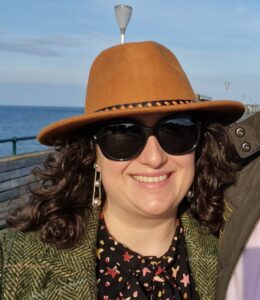 I am Annmarie and recently diagnosed with lupus (SLE). I work in civil service and have done for many years, prior to that working with animals.
I am Annmarie and recently diagnosed with lupus (SLE). I work in civil service and have done for many years, prior to that working with animals.
My lupus journey started with tiredness, I was always tired, no matter how much I rested I was tired. Initially, I put this down to many other things, shift work and being generally busy. In 2021 I ended up in Hospital with the not covid flu where concerns were raised about my liver function. Then over the following months, my hands started to swell and the pain in my fingers and hands at times was unbearable. I saw the GP many times and had lots of blood tests all centred around my liver function. Then a GP mentioned lupus, I had never heard of it so googled furiously when I got home deciding that it can’t be lupus as at this point I didn’t have the butterfly rash on my face and was very happy out in the sun. I was signed off work as I was unable to hold things with my hands or stay awake past 8pm!
The summer of 2022 came and with it the heat and sun. Determined to prove/disprove I had enough symptoms of lupus, I sat out in the sun. Let’s just say this didn’t end well…I had horrible full-body rashes and pleuritic pain, I was so breathless I couldn’t walk and hold a conversation at the same time and some days even a phone conversation was too hard as I couldn’t breathe. I was diagnosed with lupus-like syndrome initially but after an unrelated hospital visit I was told I needed a proper diagnosis and my rheumatologist conceded it was in fact lupus. This was only 5 months after lupus was suggested by the GP so really quick to get the diagnosis. I was put on hydroxychloroquine and told take these and things will go back to normal. 9 months on and what I considered normal for me is now a thing of the past and I have a new normal. From my own research through LUPUS UK website, I have the book, the DVD, badge etc! I understand my new limitations. My lupus rash on my face is a thing to behold once it fully comes up, brought on by certain lighting (hospital lighting is particularly bad) and sunlight. I am still in bed most days by 8pm but the level of fatigue I was feeling has lessened and I am able to work from home full time. I still have hand pain that causes problems and need help getting pills out the blister pack as this is hard and reading a book/magazine is also painful. I have now just started mycophenolate mofetil and while it’s not ideal to become immunosuppressed the benefits should far outweigh the negatives.
I know that I am lucky to have been diagnosed so quickly and was happy once it was diagnosed lupus, don’t get me wrong I didn’t want a disease, especially one like this and one that is so far behind others in terms of research and support because it is not as well known as others. But I was just happy to be able to have something to fight/treat/deal with as I like to be able to fix problems and for that to happen it had to be diagnosed. I still feel frustrated that there is no cure but there are ways to improve it and lessen flares so that is what I am trying to do. I wear hats, sunglasses, suncream and UV protection clothing alot, and try not to do anything that will cause my immune system to be boosted. The hardest thing for me so far is having to stop doing certain things and pre-plan things like a dinner out, I need an early table time and have to consider venues due to lighting and be fully aware that the following day I will be lucky if I can get out of bed.
If I can give any advice its to not give up, do not be dismissed, (easier said than done) stay positive, remember you are not alone and plus, it could always be worse at least we can adapt and try to overcome! Thank you LUPUS UK for everything as without the website for advice I would be truly lost.
Sarah Mei Ying North

Hi I’m Sarah, I’m 43 years old and am a full-time professional and lupus warrior since 2010 who loves life, family, travel and adventure!
I had suffered from various aches and pains but wasn’t diagnosed until I had to attend A&E with extreme sciatica. The blood tests during my visit identified that I had SLE and I was referred to a rheumatologist straight away. At the time I didn’t really digest it due to the pain I was in and just waited to speak to the specialist consultant.
My rheumatologist was extremely helpful during my first appointment, explaining SLE and how it could be managed. I was also given a direct number for the rheumatology nurse who I could call and was provided with information leaflets.
I wasn’t too emotional. When it comes to myself, I tend to be quite matter-of-fact. I was glad to know what I had and how I could manage it to minimise the impact on my life. It helped me understand some of the pain I had been having which in a way gave me peace of mind.
Read information available but always take guidance from your rheumatologist. Like any illness, SLE has a scale and your rheumatologist will help you see your personal position proportionately. Ask your partner (or someone you are close to) to attend appointments with you so that they can understand SLE better too, it’s often referred to as an invisible illness (dependent on your symptoms) which can make it harder for others to understand.
Keep a diary so you can so get a better understanding of what may trigger a flare and most importantly, be kind to yourself!
Keelie McGurk
 My lupus journey started in January 2022, aged 28 at the time, when I felt ‘different’ to usual. I was developing symptoms such as extreme fatigue and deep chest pain, to which I was diagnosed with costochondritis by the GP. In April 2022, I ran a half marathon and despite having trained, the event itself was not the most satisfying experience for me. After the first 5k, I started to experience fatigue, joint pain, chest pain and nausea. I still managed to get around the track but just knew something wasn’t right. So, the following days and weeks were filled with GP appointments and following blood results displaying low c3, c4, I was referred to rheumatology. Luckily, I have private healthcare through my employer so I was very fortunate in that from the first appointment with the specialist, I was diagnosed with lupus within 4 months, which for any lupus sufferer knows that is quite a miracle! I had many tests to rule out other conditions and the dreaded day arrived when the consultant informed me I had lupus. Initially, I was devastated. I felt trapped and frustrated that I had been told I have a chronic condition to which there would be no cure, the only treatment is to manage it. In the following months of diagnosis, I suffered with an altered state of my mental health and struggled in other areas as well as the effect lupus was having on me. But, here we are, 9 months after diagnosis, a daily dose of hydroxychloroquine, regular 12-week visits to the rheumatologist and I feel my lupus is very well managed. I still experience flare-ups, but I am more prepared for them now.
My lupus journey started in January 2022, aged 28 at the time, when I felt ‘different’ to usual. I was developing symptoms such as extreme fatigue and deep chest pain, to which I was diagnosed with costochondritis by the GP. In April 2022, I ran a half marathon and despite having trained, the event itself was not the most satisfying experience for me. After the first 5k, I started to experience fatigue, joint pain, chest pain and nausea. I still managed to get around the track but just knew something wasn’t right. So, the following days and weeks were filled with GP appointments and following blood results displaying low c3, c4, I was referred to rheumatology. Luckily, I have private healthcare through my employer so I was very fortunate in that from the first appointment with the specialist, I was diagnosed with lupus within 4 months, which for any lupus sufferer knows that is quite a miracle! I had many tests to rule out other conditions and the dreaded day arrived when the consultant informed me I had lupus. Initially, I was devastated. I felt trapped and frustrated that I had been told I have a chronic condition to which there would be no cure, the only treatment is to manage it. In the following months of diagnosis, I suffered with an altered state of my mental health and struggled in other areas as well as the effect lupus was having on me. But, here we are, 9 months after diagnosis, a daily dose of hydroxychloroquine, regular 12-week visits to the rheumatologist and I feel my lupus is very well managed. I still experience flare-ups, but I am more prepared for them now.
My advice for someone who has been diagnosed with lupus, especially at a young age, is to learn to manage your flare-ups in line with the activities going on in your life at the time. If it means saying no to a social event, find the courage to say no. If it means taking a step back every so often, do so. If you know you need support, please reach out and seek support. If you feel your lupus is starting to get out of control, seek medical assistance as soon as possible.
I will be 30 years old in November, and my goal is to continue to not let lupus define me or dominate me. The most difficult part about lupus is that it is not always visible, so I am going to try and open up a bit more to those around me to share how it affects me, in order to raise awareness of the condition.
I am not a lupus patient; I am a lupus survivor!
Akeela Musa
 Hi, I’m Akeela I’m 46 years old.
Hi, I’m Akeela I’m 46 years old.
Before the age of 25, I hadn’t experienced any known symptoms of lupus and was generally a healthy individual. I got married to Aakil in 1999 and now have two children Zainab (18) and Yahya (15).
Around Jan 2003 at the age of 25, I was experiencing intermittent joint pain in my wrists, and my left thumb. This was ongoing for a few months and went undiagnosed. Privately an MRI scan was taken of my wrist which appeared normal and then physiotherapy. No blood tests were performed and no screening for any autoimmune conditions. I managed with ibuprofen whenever the pain was unbearable. I hold a BSc (Hons) in Pharmaceutical and Cosmetic Science and at the time I used to work in the Pharmaceutical industry in drug research in Surrey.
In November 2003 (age 26) I was diagnosed with Myasthenia Gravis (MG)- a rare muscle weakness autoimmune condition, in my first full-term pregnancy. This was life-changing for me, my husband and I moved to Leicester to be near family and friends. I stopped work due to ill health. My joint pain wasn’t as intense as my muscle weakness. I explained the intermittent joint pain to my new neurologist Dr Lawden in 2004 in Leicester an amazing, compassionate and kind gentleman. He then referred me to a rheumatologist, in 2005 another great consultant Dr Sheldon, who immediately had all the lupus diagnostic blood tests carried out which were positive. I was a little taken aback, now having Myasthenia and lupus. The lupus wasn’t really presenting itself to a great degree at that time and my MG was more of a challenge as I was struggling with walking and generalised muscle weakness which was life-changing. I was told if symptoms got worse then further medication could be given, but the prednisolone I was on for MG would help SLE.
I keep saying to myself to take each day as it comes and get through whatever I can in the best manner. Every day is a blessing and there are always others worse off than myself. My Islamic faith is very strong and I get much peace and strength knowing that illnesses can be a form of blessing too as it was bringing me closer to my Creator.
Over the years my lupus has become more active than my MG and I had my first major flare in 2013 after a safari trip in Africa (may have been the intense sunlight/UV light) it took a few weeks in hospital for the pain, intense itchy rash and swelling to subside with the correct medical treatment.
Since then, I’m extremely careful with UV protection, and limiting any sun exposure to a very bare minimum. Many lifestyle changes have been made over the years, I socialise at a bare minimum and am extremely careful around anyone with even coughs and colds as I’m very prone to infections and can become unwell very quickly.
I’m very grateful to my Creator, who has surrounded me with an amazing supportive husband, (who now works from home) and caring compassionate children, wonderful friends and family. Having a support network of caring people who understand is key, it’s often a very hidden illness that not many are aware of nor understand. My children have actively created awareness in their schools, and community and participated in walks and bike rides for lupus awareness.
My lupus nurse Mandy is amazing and always happy to return a call via a text message when support has been needed, this has been of paramount importance, especially as routine rheumatology appointments are approximately annually now.
I’m happy to be able to help anyone diagnosed in any capacity I can. I can say with confidence, this time won’t last, each day is a new day.
Do what you can as best as you can, and learn to say ‘no’ if you can’t, people who love and understand you will always be supportive. Being positive and focused on being well and balancing life in a healthy way, physically, mentally, spiritually, and emotionally is the key. Easier said than done, but we must do our best.
Laura
 Hey, my name is Laura and I am 24 years old from Cardiff and I work as a software engineer.
Hey, my name is Laura and I am 24 years old from Cardiff and I work as a software engineer.
I was initially diagnosed with lupus nephritis around the age of 14, however, I have very likely had lupus since I was around 9/10 years old. My only symptom at that time was a butterfly rash which went undiagnosed despite seeing many doctors over the years including a dermatologist.
The summer before I started my GCSE year, I started to become very ill after a month prior having had kidney pains which at the time was thought just to be some kind of virus. This led to me to go into hospital for a number of weeks where after many tests I was finally diagnosed with lupus nephritis.
Not long after this, I was back in with another serious attack but ever since I’ve only had minor attacks and have been able to push through and graduate from university, and now work as a software engineer.
After a recent kidney biopsy, it has been discovered that the damage done to my kidneys over the years has led to them slowly losing functionality and will result in the next few years of me needing a kidney transplant.
After being diagnosed my nephrologist recommended reading material and websites on lupus from the NHS, LUPUS UK and Kidney Wales which I found useful in helping me understand lupus.
A few years later I came across one of LUPUS UK’s support groups which I have found to be amazing when it comes to learning about lupus through hearing about other’s experiences.
To someone who is newly diagnosed, I would recommend that they listen to their instincts as you know your body the best. I would also recommend that you look out for groups online and in your local area that you can join as they are an amazing way to learn about lupus and connect with others going through a similar experience to yourself.
Leah-Kara Johnson
 Hi I’m Leah-Kara, 31-year-old School Administrator from North London.
Hi I’m Leah-Kara, 31-year-old School Administrator from North London.
I was diagnosed with Lupus at the age of 17 after experiencing excruciating shoulder pain and patches on my palms which led me to constantly covering them with gloves. The first time I went to the doctors I was told “it’s just eczema”, but my mum demanded a second opinion. The next doctor I saw arranged for me to have a few tests done at the hospital, I was diagnosed a short while later and felt a sigh of relief to finally know why I was experiencing these symptoms.
The following years turned into a rollercoaster of flare-ups; constant fatigue, joint pain, blood clots, inflammation and eventually kidney failure to name a few. The hospital became my second home, medication became my best friend and by the time I reached 18, I was the proud owner of a walking stick.
I was still trying to understand what Lupus was as I had never heard of it before my diagnosis. I would constantly research the causes while I asked myself “Why me?” Why is my body battling against me? I’d spend my time scrolling online (when my joints were having a good day of course!) to learn more about Lupus since I never knew who else to turn to. At first I felt confused, upset and punished. I felt angry at the world for being unable to enjoy that transitional stage from teenage hood to adulthood, although I still feel my Lupus every day I’ve now learned to live with it.
To those of you who have just been diagnosed, no you are not lazy, brain-fog is a real thing and there are tough times ahead so please take advantage of the good days when they come. The pain will be invisible to others so do ask for support when needed and keep fighting because you’ve got this! Join Facebook groups and meet others who are going through the same thing as there’s nothing more comforting than those who understand you. Lastly, listen to your body, rest when you need to and please please please take your medication, the ‘moon face’ won’t last forever! Stay positive and stay strong. The key to learning to live with Lupus is learning to accept it.
Becky
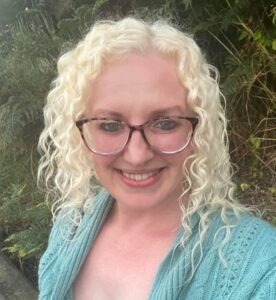 Hi, my name’s Becky and I’m a Lancashire lass who’s now more of an honorary Geordie seen as I’ve been in Newcastle for the past 22 years.
Hi, my name’s Becky and I’m a Lancashire lass who’s now more of an honorary Geordie seen as I’ve been in Newcastle for the past 22 years.
I was first diagnosed back in April 2008, so I’ve just passed my 15th anniversary. I started with very painful hands and feet, and as it wasn’t usual for me, I went to my GP, who did some blood tests, and then sent me up to Rheumatology, three months later, I was diagnosed with SLE, then 4 months after that, with Rheumatoid arthritis. I felt sore and a bit numb at first, all I’d heard was it was life-limiting (thanks House!) but once I’d been given the right resources to learn more about it via my consultant, and spent some time with my amazing Occupational therapist, it wasn’t as scary. If I’m honest, I’m still dealing with the emotions it all brings. Every year a new thing crops up that I can’t do anymore, or a part of my life’s journey I won’t be able to accomplish, however, it makes me resilient, and stronger with each challenge.
Advice for anyone who is newly diagnosed? Go with all your emotions, just get them all out, it’s ok to be scared, heartbroken, and angry! But don’t do it alone, and seek out help both physical and mental.
It’s probably going to feel at times it’s a losing battle, but it’s not, it might take a while to find the plan that works best for you, but your medical team are just that, your teammates, you’ll all get there together.
Zainab
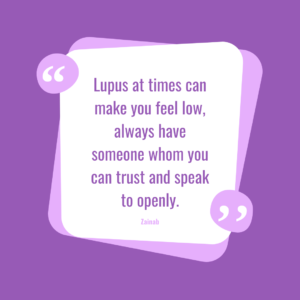 My name is Zainab. I like spending time with family. My biggest achievement was that I managed to raise awareness among my family and friends about what lupus (SLE) is and how it affects me on a day-to-day basis.
My name is Zainab. I like spending time with family. My biggest achievement was that I managed to raise awareness among my family and friends about what lupus (SLE) is and how it affects me on a day-to-day basis.
It took almost a year for me to be diagnosed with lupus (SLE). The symptoms I had before my diagnosis were high temperature, butterfly rash, protein uria, mouth sores, constant coughing, fatigue and pain and swelling of the joints.
I was relieved in the sense they determined what was wrong with me and they were able to diagnose and help start my treatment to help me through this journey. However, I was also scared because I was told how it may affect me in different ways. For example when I got diagnosed with lupus, I had to re-plan my future. Before my diagnosis, I wanted to become a nursery nurse.
Once I was diagnosed with lupus (SLE), I started looking around and found a charity that helps lupus patients. The charity, LUPUS UK was very helpful. They gave me a lot of information about lupus. Additionally, I could contact others with lupus to discuss their experience and what their coping mechanisms were.
The advice I give to people that are diagnosed or are yet to be diagnosed is to learn how to tell a flare is coming. See your doctors regularly and get enough sleep and rest. Lupus at times can make you feel low, always have someone whom you can trust and speak to openly.
Katie
 My name is Katie and I’m 26 years old.
My name is Katie and I’m 26 years old.
In March 2022, unbeknown to me I started to experience my first lupus symptoms. I would wake up in the morning with sore, swollen, painful hands/fingers. I brushed the symptoms aside and tried not to think too much of it, convincing myself I was simply getting ‘old.’
As the year progressed, my symptoms worsened. Migraines, extreme joint pain, unexplained weight loss and loss of appetite to name a few.
Once I’d convinced myself this was no longer okay, I finally visited my GP in November 2022 and was started on anti-inflammatories; however, after a couple of weeks, the symptoms started to come through again. I was then trialled on steroids, which more or less relieved most of my symptoms. The doctor was also referring me to a Rheumatologist but told me to expect months of waiting for an appointment.
Months passed. Then unknowingly to me, in March 2023, I experienced my first ‘flare up’ and was admitted to the hospital for 5 days. During this time, I was seen by a Rheumatologist and given my diagnosis, Lupus.
Relief. I finally had answers and felt like there was light at the end of the tunnel. I am since learning to navigate a new way of life, and now with the right treatment and by being a bit kinder to myself; I am slowly starting to feel well again, but this is only the beginning of my journey. I used online resources to learn more about my condition, along with information and help from the specialist.
I am scared, there is still a lot I don’t know about lupus and lots of new experiences and challenges ahead I will face as a result. It is the unknown, it’s isolating and overwhelming but slowly I am feeling more and more positive and learning to live with lupus. Some advice… ask for help and don’t struggle in silence. It is hard but better/easier times are ahead.



 ©2024 LUPUS UK (Registered charity no. 1200671)
©2024 LUPUS UK (Registered charity no. 1200671)